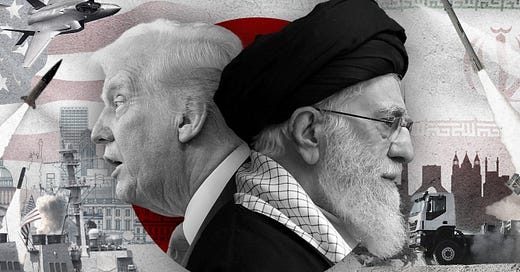If you asked the average native-born American whether they would erase from the record of history the great wars of the United States — the Civil War, the War for Independence, our storming of the beaches at Normandy — if you could somehow play God and delete those events from history so that not a single life was lost— they would say no.
Not because they love violence, but because those bloody battles gave America its muscular and heroic identity. They feel that something sacred was forged in those battles.
That we’re fighters, that we spilled our blood for freedom. The sacrifice, the struggle, the valor — it’s a crucial part of our heroic identity.
But if you asked those same people if they would be willing to fight in a similar war now, they’d say no. They know it’s hell. They know it destroys families, devours economic resources and leaves behind a mountain of broken veterans.
So how does war keep happening?
I'm not talking here about the Henry Kissingers of our political class (of which there are many) — the professional war-mongers who pursue endless conflict for geopolitical leverage, for access to resources, for influence over global markets.
I’m talking about the deeper mystery of how the average citizen, who is usually skeptical and exhausted, finds themselves not just drawn into, but actually supporting yet another war.
The answer, according to William James, is that war serves deep psychological and cultural functions for a people. It gives people a chance to rise, to sacrifice, to feel noble. This is especially true for Americans, as we’ve shown, whose national story has always been one of rebellion and moral combat.
Conflict also creates a deep sense of belonging. In a country lacking genuine fellowship and community, rallying against a common enemy becomes a substitute for solidarity. War gives us unity — the wrong kind, but unity nonetheless.
James argued that unless we build cultural machinery that channels the martial virtues of sacrifice, courage, honor and nobility into civic enterprises, the battlefield will always beckon.
All it takes is a little manufactured fear, a little public myth-making and an enemy drawn just vividly enough to stir that old ‘heroic’ feeling. And the public, having long said “we don’t want war”, suddenly wants it again.
James calls for a “moral equivalent of war” — worthy causes that stir our heroism without requiring blood, such as vast projects of public labor and shared purpose.
Sadly, this isn't just an American problem, it’s the universal propaganda playbook: create a villain, stir the martial instincts, frame war as a moral necessity — and watch the people rile themselves up and march forward into another senseless conflict.
We’re watching this playbook unfold right now with Iran.





Well done, Omar! This is a much needed article. I’ve always wondered why so many Americans believe they live in “the greatest country in the world” when the US ranks so low on so many things that matter, like education, healthcare access, life expectancy, and more. I believe a lot of our conception of what makes us great is our warmaking ability. And this is also what makes us so predisposed to flex our “greatness” without flinching. People think, “they shouldn’t have messed with us,” and feel slightly proud, even as they are personally surrounded by unnecessary hardship (which is partly a result of the prioritization of the Pentagon at the expense of everything else).